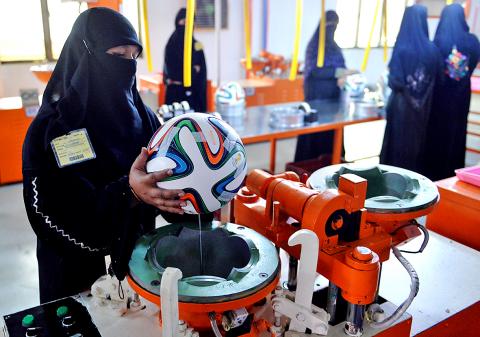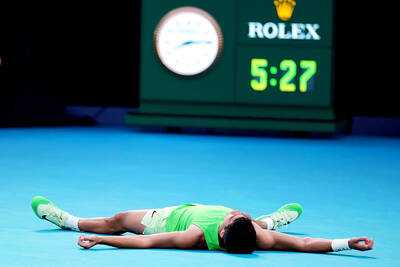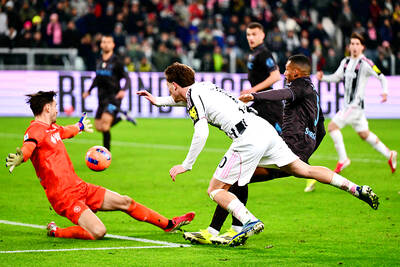She has no idea who Lionel Messi is and her country is not taking part, but Pakistani mother-of-five Gulshan Bibi cannot wait for the FIFA World Cup to start on June 12, because she helped make the balls for world soccer’s elite competition.
When Brazil and Croatia kick the tournament off in Sao Paolo next week, there is a good chance they will be using a ball made by Gulshan and her colleagues at the Forward Sports factory in Sialkot, a town in the east of Pakistan.
“I’m really looking forward to the World Cup and inshallah [God willing] we will watch the matches. The balls we make will be used and all the women who work here are very proud,” Gulshan said.

Photo: AFP
Cricket-crazy Pakistan might not have much of a soccer team — they are No. 159 in FIFA’s world rankings — but Sialkot has a long history of manufacturing top-class balls.
Forward Sports has been working with Adidas since 1995 and supplies match balls to some of the world’s top soccer competitions, including the Champions League, the Bundesliga and now the World Cup.
It is believed that the company was started by a cobbler who was once asked to repair a punctured ball for colonial-era British soldiers and later studied how to make them. So began a successful business that spawned an industry, but child labor scandals in the 1990s almost sank the firm.
International brands now work closely with factories and non-governmental organizations to enforce stringent checks to prevent any return to the dark days of children stitching balls in dingy backrooms.
At Forward Sports, workers must provide government ID to prove they are over 18 and while the basic 10,000 rupee (US$100) monthly salary likely makes the US$160 FIFA-approved Brazuca unaffordable for the workers who produce them, several privately told reporters that said the company looks after them well.
Assembling modern match balls is not simply a matter of sitting down with a needle and thread. The Forward Sports plant stands barely a free-kick’s distance from the dust and chaos of Grand Trunk Road, an ancient highway that cuts across the subcontinent all the way to Kolkata.
Order and efficiency reign inside the factory, where on the Brazuca production line, women in headscarves, some with their faces veiled, work briskly. They start with flat white propeller-shaped pieces of polyurethane, add the Brazuca’s distinctive bright colors and glue the panels to the ball’s rubber bladder.
The seams are then treated with a special sealant and the ball heated and compressed in a spherical clamp to give it the correct shape.
The heat also activates the temperature-sensitive bonding compound that holds the ball securely together. The whole process from flat panels to finished item takes 40 minutes — speed is crucial to prevent impurities getting into the ball — and the factory can produce up to 100 per hour.
It is a high-tech process for Pakistan, where much of the workforce is unskilled and poorly educated, with only about half the population literate.
“We take unskilled workers and train them — this is a job that is not available anywhere else. You have to get someone with good attitude and train them,” Forward Sports CEO Khawaja Masood Akhtar said.
Ninety percent of those working on the Brazuca line are women, which is unusual in Pakistan, where women are largely expected to stay at home with families, but Akhtar said they were more diligent and meticulous than their male colleagues.
Making the Brazuca was no simple matter for Forward, as Adidas gave the order at short notice when they realized their main manufacturer in China was unable to meet demand.
In just longer than a month, Forward managed to source the equipment it needed to make the Brazuca from scratch.
“It was a matter of honor for us, we wanted to do it,” Hassan Masood Khawaja, head of new product development at the company, told reporters.
Quality control is crucial, as the world’s No. 1 soccer tournament and greatest players demand the best equipment.
In the gleaming labs of Forward Sports, white-coated technicians put the Brazuca, which weighs 437g and has a circumference of 69cm, through a battery of tests on precision equipment brought from Germany.
One machine rotates the ball while a curved arm tracks its surface, measuring 4,500 points and plotting its shape in 3D on a computer to ensure it is properly round. Other devices measure bounce, resistance to water and mold, even the glossiness of the ball’s surface.
The ball’s durability is also rigorously tested. A special machine fires Brazucas at a flat metal plate, ensuring that they can survive 3,500 impacts at 50kph.
The Brazuca was designed after the controversy that dogged the Jabulani ball at South Africa 2010, slammed for its erratic, unpredictable flight.
Scientists concluded the machine-made Jabulani was too smooth and too perfectly spherical to fly straight, with a tendency to slow suddenly in mid-air.
Adidas spent two-and-a-half years working on the new ball, testing it in 10 countries with 600 players from 30 teams, including Argentine Messi, England’s Steven Gerrard and Germany’s Bastian Schweinsteiger.
The deeper seams and textured surface of the Brazuca should disrupt the airflow over its surface, helping it fly more like a traditional 32-panel ball.
Khawaja said the likes of Messi and Ronaldo should have no nasty surprises in Brazil, at least not form the ball.
“We want this ball to be the same they are used to playing with in the Champions League, for instance, they should not feel a difference,” he said.

Nottingham Forest FC are to go into the Europa League play-off round after a 4-0 win over Ferencvaros TC on Thursday, while Celtic FC secured their place in the knockout phase with a victory over FC Utrecht. Aston Villa FC finished second in the league phase after recovering from two goals down to beat FC Red Bull Salzburg 3-2 with their spot in the last 16 already assured. Forest stood an outside chance of climbing into the top eight going into the final round of matches, but needed to beat Robbie Keane’s Ferencvaros and rely on other results going their way. Sean Dyche’s

Luka Doncic on Monday produced a 46-point masterpiece as the Los Angeles Lakers snapped the Chicago Bulls’ four-game winning streak with a 129-118 victory on the road. Doncic rattled in eight three-pointers on 15-of-25 shooting from the field, finishing with seven rebounds and 11 assists to lead an impressive Lakers effort at the United Center. LeBron James chipped in with 24 points, five rebounds and three assists, while Rui Hachimura delivered an eye-catching cameo off the bench with 23 points from nine-of-11 shooting. The win was another encouraging result for the Lakers after a 116-110 defeat of the Dallas Mavericks on Saturday. “We did

BATTERED AND BRUISED: Alcaraz suffered a cramp in the third set, but was allowed treatment despite Zverev’s protests, and continued on to win in five-and-a-half hours An ailing Carlos Alcaraz battled past Alexander Zverev yesterday in five epic sets to reach his first Australian Open final and move within a match of becoming the youngest man to complete a career Grand Slam. The world No. 1 outlasted the German third seed 6-4, 7-6 (7/5), 6-7 (3/7), 6-7 (4/7), 7-5 over a titanic 5 hours, 27 minutes in hot conditions to head to tomorrow’s title match. He only narrowly avoided crashing out after a huge fright at 4-4 in the third set when he pulled up in pain with what appeared to be cramp. He was allowed to have treatment

Juventus on Sunday dealt a huge blow to SSC Napoli’s Serie A title defense with a 3-0 win in Turin which left the reigning champions nine points behind league leaders Inter, who are pulling away from the chasing pack. Jonathan David, Kenan Yildiz and Filip Kostic netted in Turin as Juve, a revitalized team under Luciano Spalletti, moved into fourth with a statement win. Juve are fifth and one point behind both Napoli and AS Roma, who lifted themselves into third with a 1-1 draw with second-placed AC Milan in Rome. “We played really well and had fun ... today we were great,”